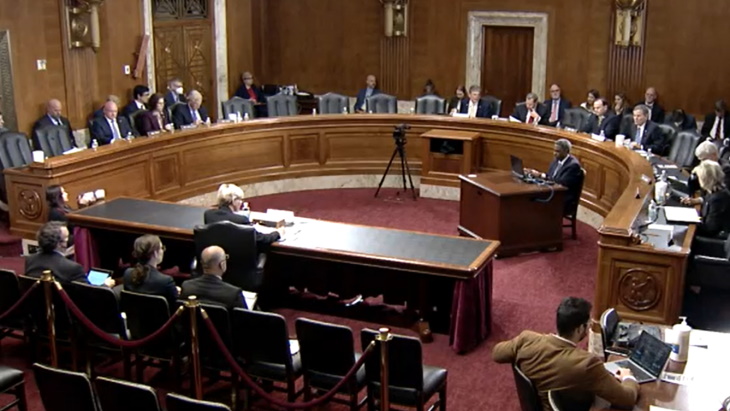Granholm testified at the committee's 5 May hearing on the US Administration's budget request for the DOE for fiscal 2023. During the hearing, the committee's chairman, Senator Joe Manchin, highlighted the need for the USA to strengthen its energy and national security and eliminate reliance on resources from "hostile" nations, and asked how the budget request would help to achieve that goal.
"The ongoing crisis in Ukraine is severe," Manchin said, adding that Russian President Vladimir Putin had used energy as a weapon to leverage power over European democracy, "and intends to do the same globally, using Russia's abundant energy resources." To counter this, the USA has already taken steps including banning the import of Russian oil, petroleum products, LNG, and coal, while also authorising additional LNG export capacity. "These are critical moves to stop funding Putin's brutal war on the Ukrainian people - but there is more we can and must do," he said.
In her testimony, Granholm spoke of the "enormous consequences" of Russia's action in Ukraine on the future of energy. "Stated bluntly, the situation in Ukraine and the impact on gas prices has highlighted the national security importance of our energy investments," she said. The FY 2023 request includes new and expanded investments to increase energy security and deploy domestically manufactured clean energy, she noted.
Senator John Barrasso - the committee's most senior Republican member - asked Granholm if President Biden would ban imports of Russian uranium.
"I'll let the president make that statement, but I can say that this is a point on which I think we have a lot of agreement," Granholm replied. "We should not be sending any money to Russia for any American energy or for any other reason," she said.
DOE has set up a team - led by Huff - to develop a full uranium strategy through an interagency process, she said. "We want to make sure, for example, that we are able to supply HALEU (high-assay low-enriched uranium) as well as low-enriched uranium to our civilian nuclear fleet. If we move away from Russia, we want to make sure we have the ability to continue to keep the [nuclear generating] fleet afloat."
Further information about the uranium strategy - which will also cover establishing a full US supply chain for HALEU - is likely to be announced "in the next month or so", Granholm said.
She also confirmed to the committee that the DOE would make purchases for the strategic uranium reserve - for which Congress allocated USD75 million in 2020 - during the present calendar year.
The USA currently imports most of the uranium used to power its nuclear reactors. According to data from the US Energy Information Administration, 47% of the uranium purchased in 2020 by owners and operators of the USA's civilian nuclear power reactors originated from Kazakhstan, Russia, and Uzbekistan. Uranium of Canadian and Australian origins together accounted for 34%.
Huff appointment confirmed
The US Senate yesterday also confirmed Kathryn Huff to serve as Assistant Secretary for Nuclear Energy at the DOE with a bipartisan vote of 80-11. Huff has served as principal deputy assistant secretary since May 2021.
"Dr Huff has been a trailblazer for her entire career in nuclear engineering, and she brings endless enthusiasm and curiosity to her work," Granholm said after the Senate vote, going on to describe Huff as "an invaluable leader in our work to tackle the climate crisis, increase our energy security and independence, and provide affordable, reliable energy for all Americans."





_23009.jpg)

_13505.jpg)
_87975.jpg)






